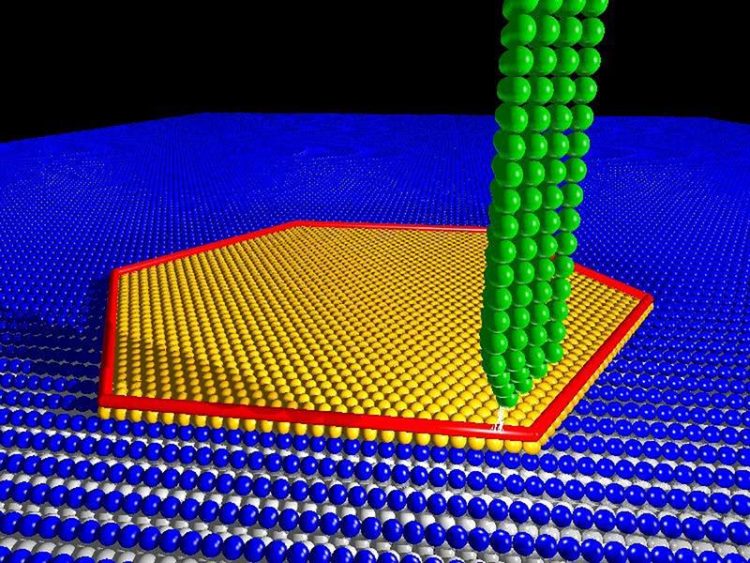On the way to robust quantum computers

Illustration of an atomically high iron island (yellow) on a superconducting rhenium crystal and with the Majorana edge state (red) at the periphery. UHH/MIN/Kim/Wiesendanger
The development of quantum computers is the major goal of industrial and university research efforts worldwide. The main problem in the realization of a quantum computer is the sensitivity of quantum states to external perturbations.
Majorana quasiparticles have raised great hopes for the future of quantum computers since they are robust against disturbing influences from the environment in contrast to other kinds of quantum bits.
Last year, the Hamburg research group headed by Prof. Dr. Roland Wiesendanger had already observed Majorana states at the ends of magnetic chains of individual iron atoms on a superconducting rhenium crystal.
The same team has now succeeded in directly observing Majorana states at the edges of iron islands – which are only one atomic layer high – on rhenium.
The formation of an exotic superconducting state was observed as a prerequisite for the formation of Majorana states. The experimental results could be explained and interpreted by a theoretical study carried out simultaneously by researchers from Hamburg and Chicago.
The coupling of Majorana edge states on atomic islands and Majorana end states in atomic chains can be used to realize elementary building blocks for memory and logic operations of a quantum computer.
The demonstration of basic computational operations based on Majorana states is now the next major goal of the Hamburg researchers on their way to a robust quantum computer.
Prof. Dr. Roland Wiesendanger
Faculty of Mathematics, Informatics and Natural Sciences
Department of Physics
Phone: +49 40 42838-5244
E-Mail: wiesendanger@physnet.uni-hamburg.de
Heiko Fuchs
Faculty of Mathematics, Informatics and Natural Sciences
Dean's office, science editorial office
Phone: +49 40 42838-7193
E-Mail: heiko.fuchs@uni-hamburg.de
A. Palacio-Morales, E. Mascot, S. Cocklin, H. Kim, S. Rachel, D. K. Morr, and R. Wiesendanger, Atomic-scale interface engineering of Majorana edge modes in a 2D magnet-superconductor hybrid system, Science Advances 5, eaav6600 (2019).
Media Contact
More Information:
http://www.uni-hamburg.de/All latest news from the category: Physics and Astronomy
This area deals with the fundamental laws and building blocks of nature and how they interact, the properties and the behavior of matter, and research into space and time and their structures.
innovations-report provides in-depth reports and articles on subjects such as astrophysics, laser technologies, nuclear, quantum, particle and solid-state physics, nanotechnologies, planetary research and findings (Mars, Venus) and developments related to the Hubble Telescope.
Newest articles

High-energy-density aqueous battery based on halogen multi-electron transfer
Traditional non-aqueous lithium-ion batteries have a high energy density, but their safety is compromised due to the flammable organic electrolytes they utilize. Aqueous batteries use water as the solvent for…

First-ever combined heart pump and pig kidney transplant
…gives new hope to patient with terminal illness. Surgeons at NYU Langone Health performed the first-ever combined mechanical heart pump and gene-edited pig kidney transplant surgery in a 54-year-old woman…

Biophysics: Testing how well biomarkers work
LMU researchers have developed a method to determine how reliably target proteins can be labeled using super-resolution fluorescence microscopy. Modern microscopy techniques make it possible to examine the inner workings…





















